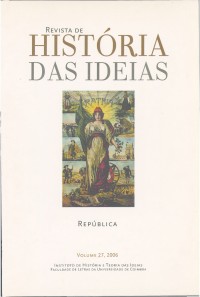Please use this identifier to cite or link to this item:
https://hdl.handle.net/10316.2/41645| DC Field | Value | Language |
|---|---|---|
| dc.contributor.author | Antunes, José | - |
| dc.date.accessioned | 2017-05-07T22:02:58Z | |
| dc.date.accessioned | 2020-09-30T11:26:22Z | - |
| dc.date.available | 2017-05-07T22:02:58Z | |
| dc.date.available | 2020-09-30T11:26:22Z | - |
| dc.date.issued | 2006 | - |
| dc.identifier.issn | 0870-0958 | - |
| dc.identifier.issn | 2183-8925 (digital) | - |
| dc.identifier.uri | https://hdl.handle.net/10316.2/41645 | - |
| dc.description.abstract | A noção abstracta de Estado, na ideia de "coisa pública", Res publica, no sentido de propriedade comum a todos, em que cada um deve participar, mas da qual nenhum cidadão é exclusiva e pessoalmente titular ou responsável, concebida pelos filósofos gregos e concretizada, de certo modo, pela cidade greco-romana e pelo Império romano, não desapareceu, por completo, na Idade Média. Permaneceu subjacente não só na Igreja católica romana, definida por alguns Padres da Igreja como a universal respublica Christiana, mas também, entre alguns povos, como os visigodos e carolíngios, embora sob uma forma diferente. Nem deixou de estar presente em muitas teorias dos pensadores políticos medievais. Não só quando defendiam que o rei tinha dois corpos, um corpo natural e um corpo político, ou era uma pessoa geminada, dotada de um supercorpo real, mas também quando afirmavam que o rei era uma pessoa pública e mista, pai da lei e simultaneamente ministro e filho da Justiça. Ou que para além da coroa material e visível, de que era detentor, existia a sacra coroa suprapessoal, invisível ou um "corpo político do Estado", sob a concepção de um corpus respublicae mysticum. | por |
| dc.description.abstract | The abstract notion of the state as "public thing" - i.e., the Res publica in the sense of common property owned by all, of which everybody is a participant but over which no citizen can claim exclusive ownership or full responsibility - was a notion devised by the Greek philosophers and partly realized by both the Greco-Roman city and the Roman Empire, and it did not vanish altogether during the Middle Ages. In fact, it lay dorment not just within the Roman Catholic Church, defined by some Church Fathers as the universal respublica Christiana, but also, albeit under a different form, among peoples like the Visigoths and the Carolingians. Nor was it absent from a large number of theories held by the medieval political thinkers. This was the case, for instance, not just when such thinkers claimed that the king had two bodies, a natural body and a political body, or that he was a twinned person endowed with a royal superbody, but also when they stated that the king was a public and mixed person, at once father of the law and the minister and child of Justice. Or that, aside from the visible, material crown of which he was the holder, there was also the invisible, super-personal sacred crown or a "state body politic" conceived as a corpus respublicae mysticum. | eng |
| dc.language.iso | por | - |
| dc.publisher | Imprensa da Universidade de Coimbra | - |
| dc.rights | open access | - |
| dc.title | Res publica, res sacra: notas sobre as formas de presença da noção abstracta de Estado, na Idade Média | por |
| dc.title.alternative | Res publica, res sacra: notes on the diverse occurrences of the abstract notion of "the state" during the Middle Ages | por |
| dc.type | article | - |
| uc.publication.collection | Revista de História das Ideias vol. 27 | - |
| uc.publication.firstPage | 41 | - |
| uc.publication.lastPage | 65 | - |
| uc.publication.location | Coimbra | - |
| uc.publication.journalTitle | Revista de História das Ideias | - |
| uc.publication.volume | 27 | por |
| dc.identifier.doi | 10.14195/2183-8925_27_2 | - |
| uc.publication.orderno | 3 | - |
| uc.publication.area | Artes e Humanidades | - |
| uc.publication.manifest | https://dl.uc.pt/json/iiif/10316.2/41645/248385/manifest?manifest=/json/iiif/10316.2/41645/248385/manifest | - |
| uc.publication.thumbnail | https://dl.uc.pt/retrieve/11860292 | - |
| item.grantfulltext | open | - |
| item.fulltext | With Fulltext | - |
| Appears in Collections: | Revista de História das Ideias | |
Files in This Item:
| File | Description | Size | Format | |
|---|---|---|---|---|
| res_publica__res_sacra.pdf | 346.88 kB | Adobe PDF |  |
Items in DSpace are protected by copyright, with all rights reserved, unless otherwise indicated.
